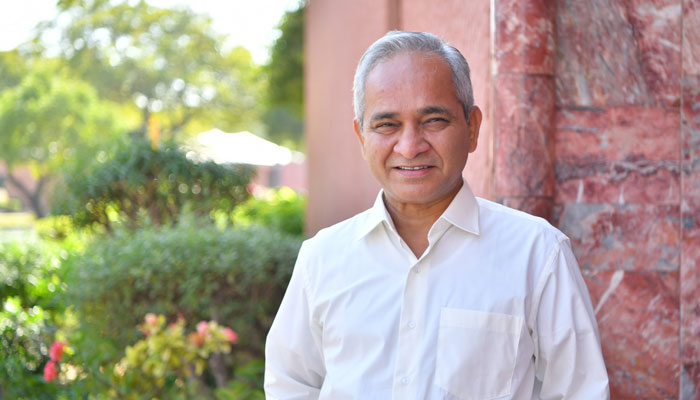Lead pollution threatens health and IQ of children, warn experts
A study co-authored by Aga Khan University’s (AKU) Dr Zafar Fatmi has shed light on the urgent health and developmental risks that lead exposure poses to the global population, particularly the children.
Published in The Lancet Planetary Health, the research warns of the far-reaching impacts of lead, which is common in Pakistani environments through vehicles, industrial activities and especially through low-cost lead-acid batteries commonly used in vehicles, households and businesses.
Dr Fatmi, the head of the section for environmental, occupational health and climate change at the AKU’s Community Health Sciences, pointed to lead’s devastating toll on cognitive development of children, life expectancy and productivity.
“In Pakistan, exposure to lead is affecting children’s cognitive functions, lowering IQ scores, and harming adults’ health including cardiovascular diseases leading to significant productivity losses,” he explained.
The study led by the Stanford University and including experts from global institutions like Johns Hopkins Bloomberg School of Public Health and the University of Southern California reveals that over 5 million tonnes of lead were released into global environment in 2022, largely from batteries—a trend seen in Pakistan as well.
The study identifies that lead pollution leads to premature deaths and chronic illnesses, particularly cardiovascular diseases, accounting for an estimated 5.5 million deaths globally each year.
In Pakistan, a substantial population remains at risk from contaminated soil, cosmetics, water and food sources, especially those in urban centeres. Children in Pakistan, like in other low- and middle-income countries, are notably vulnerable due to the higher lead levels present in environment.
“Lead exposure in Pakistan, driven by lead-based batteries and industrial practices, is a neurotoxic threat to young generations. Beyond health impacts, lead also harms ecosystems and entire food chains,” Dr Fatmi stated, adding that countries like Pakistan bore a disproportionate burden due to limited recycling infrastructure and inadequate regulation.
The authors have advocated for complete phasing out lead by 2035, suggesting a tax on lead products and international regulations to classify lead as toxic waste. In Pakistan, such a decision could translate into critical health improvements, given the lack of economic need for lead in modern products.
The study notes that lead-related economic output is less than $100 billion worldwide, an amount that pales in comparison to the costs of lost productivity, healthcare expenses, and shortened lives. “A paradigm shift is essential,” said Dr Fatmi, emphasising the need for robust policies and investment in safer alternatives.
-
 Prince Harry Defends Friends In London Court
Prince Harry Defends Friends In London Court -
 AI May Replace Researchers Before Engineers Or Sales
AI May Replace Researchers Before Engineers Or Sales -
 Christina Haack Goes On Romantic Getaway: See With Whom
Christina Haack Goes On Romantic Getaway: See With Whom -
 Consumers Spend More On AI And Utility Apps Than Mobile Games: Report
Consumers Spend More On AI And Utility Apps Than Mobile Games: Report -
 Aircraft Tragedy: Missing Tourist Helicopter Found Near Japan Volcano Crater
Aircraft Tragedy: Missing Tourist Helicopter Found Near Japan Volcano Crater -
 Taylor Swift Lands In Trouble After Blake Lively Texts Unsealed
Taylor Swift Lands In Trouble After Blake Lively Texts Unsealed -
 'Prince Harry Sees A Lot Of Himself In Brooklyn Beckham'
'Prince Harry Sees A Lot Of Himself In Brooklyn Beckham' -
 Kate Middleton’s Cancer Journey Strengthens Her Commitment To Helping Children
Kate Middleton’s Cancer Journey Strengthens Her Commitment To Helping Children -
 Gaten Matarazzo Compares 'Stranger Things' Ending To 'Lord Of The Rings'
Gaten Matarazzo Compares 'Stranger Things' Ending To 'Lord Of The Rings' -
 Prince Harry Slams Publisher Over 'dirty Trick' Ahead Of Showing Evidence
Prince Harry Slams Publisher Over 'dirty Trick' Ahead Of Showing Evidence -
 Blueface Promises To Change Behaviour If His Ex Comes Back
Blueface Promises To Change Behaviour If His Ex Comes Back -
 Prince Harry Makes Crucial Promise To Meghan Markle Over UK Return
Prince Harry Makes Crucial Promise To Meghan Markle Over UK Return -
 Keir Starmer’s China Visit: UK Follows Mark Carney In Major Reset Of Ties
Keir Starmer’s China Visit: UK Follows Mark Carney In Major Reset Of Ties -
 Chris Pratt Shares Real Thoughts On AI In Film Industry
Chris Pratt Shares Real Thoughts On AI In Film Industry -
 NASA Celebrates One Year Of Trump’s Second Term With Moon And Mars Achievements
NASA Celebrates One Year Of Trump’s Second Term With Moon And Mars Achievements -
 Netflix Disappointed As Meghan Markle’s Series Struggles To Impress
Netflix Disappointed As Meghan Markle’s Series Struggles To Impress




